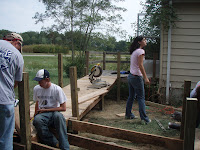




This past week was Trip Week at Lakeview, and I was privileged to accompany our sophomore class to Mountaintop Camp in Altamont, Tennessee, where we helped three families and the Mountaintop Camp itself with some building and repair projects.
Mountaintop Camp is actually made up of something like six or seven camps, interdenominational in nature, but they also work with non-religious groups like our school as well. They have what they call a "three-legged stool" approach to working with their communities: they contact businesses to donate materials; churches, colleges, or people like our school donate free labor; and they work with federal agencies to arrange extremely low-interest loans to the communities for home remodeling projects or ground-up home building projects.
In our short time there, we divided into three teams. One team was assigned to build a small deck with a porch & roof, one team was assigned to build a 22-ft. wheelchair ramp and to put a roof on an existing small deck, and my group was assigned to build a porch roof on an existing deck built last summer. If there were too many people to be working on any one job at a time, we were to ask the homeowners if there was anything else they wanted us to do. Our team worked for Mr. Leonard Gross, an 87-year-old WWII veteran--a spry, witty man living in a mobile home at the back of the brick home that he had built for his son 15 years earlier for $10,000 and donated beige brick.
Mr. Leonard, as I called him, was proud of three things: his WWII service in the Pacific, mainly in India as a medic to the mules used to haul cannon into Burma; the fact that he'd started the Rescue Squad in Grundy County some years earlier by figuring out where a lost vehicle had been left behind, stranded in the river by two lost city folk who'd walked out onto his mountain, giving him some local notoriety; and that he'd played softball until he was 76-years-old.
The boys and men on our team did most of the cutting, hammering, and nailing since we were under such a time constraint to get our job completed, though they did let the girls have a turn at learning the circular saw, the drill, and what it was like to hammer into iron-hard, untreated, rough-sawn, nail-bending, twisted and warped oak. The girls and I quickly went to cleaning the yard of brush, cement blocks, old insulation, and moving a trailer-load of lumber full of rusted nails to a pile behind the barn. The only thing they complained about were the slugs, bugs, and spiders, but that never deterred them from picking up one piece of lumber and stacking it neatly some feet away.
Mr. Leonard asked if we could repair the torn insulation underneath his trailer. Someone had cut it open looking for a leaking pipe, and as I looked through an opening in the latticework bordering the bottom of the trailer, I could see the fiberglass falling out onto the ground in several places. On the second afternoon, during a lag in the work, I grabbed a roll of duct tape and a box cutter, went over to the opening, got onto my back, and shimmied my way under the trailer. The sun at that time of the afternoon provided pretty good lighting to the middle of the trailer where I needed to work. I was thankful to find that it was dry, hard-packed dirt, not wet or musty-smelling, and it wasn't buggy or cob-webby. I was pretty close to one end of the trailer, and I tried not to look down too far toward the [very] dark end where I could imagine there were [very large] insects. The insulation was dirty and matted, and the black plastic liner had badly spaced pieces of old duct tape hanging down where someone had tried to patch it before. I surveyed the large torn area for several minutes, thinking through the best method of repair, then set to work, cutting first small pieces of tape just to put the insulation back in its place and tack the lining edges back together, then somewhat larger pieces to begin mending the tears, and last, long strips in a crosshatch to hopefully hold the large areas to one another so they wouldn't begin peeling and coming apart again.
What I didn't notice was that at this time of year the sun shifts pretty quickly, and my good light began failing. My eyes were having to work harder and harder to see what I was doing. With each decrease of light, I noticed there was an increase in small, shuffling sounds under the trailer--much too large for insects I might add. I only hoped they were mice. It was only after I came out from my cubbyhole, the skin on my back and sides already itching from the fiberglass, that Mr. Leonard said to me, "Waal, didja see any snakes in thar?"
Oh, yeah.
The only mishap on the job was not human, but kitty. There had to be twenty to thirty cats and kittens wandering the homestead as we pulled in, and the kids immediately began telling me that the kittens were mostly blind. As I looked at them, I saw that they weren't born blind, but that almost all of them had eye infections that were largely untreated, though Mr. Leonard said they had been treating them with boric acid or something similar. At a break, I took the worst small kitten I saw, probably only five or six weeks old, whose eyes were completely sealed closed by hardened matter. I worked for twenty minutes with a moist towelette from my purse to first soften the hardened matter, then to work it loose from her eyes. She only fought the last several minutes as I pulled the last of the small chunks from her fur and her eyes began to open to the bright sunlight for the first time in who knows how long. She then began to follow me around like I was her mother. Perhaps that was why, in the long run, she was killed. She came up on the deck several times with me, so I kept putting her down on the ground so she wouldn't get stepped on. But on one of my trips down the ramp, I saw her lying on her side at the base, bleeding and writhing, and I knew that she'd been stepped on inadvertently by someone coming or going. So many kittens abounded, it was almost impossible not to step on one, so it would be impossible to say who stepped on her. Nor would it matter; it was an accident. But it was as if we all spotted her at once; we all gathered around her. Someone said, "Is she dying?"
"Well, yeah! Can't you tell? Look at the blood!"
"Ohhhh!"
"Maybe she's just sleeping."
"C'mon... Don't be dumb."
"No. Someone stepped on her. Look. She's having seizures."
I said, "Someone get me a shovel." They all just stood there, staring. "NOW!" Several kids went running, thankful, I think, to have something else to do. About that time, the kitten had one last seizure, looking like a last, lazy stretch, like cats just do, and then she was still. Cree had named her Jeff, not knowing he was a she.
One of the guys ventured, "Well . . . that was interesting."
I took a shovel from someone, picked her up and placed her on it, then kicked some dirt and leaves over the bloody spot on the ground. The kids asked what I was going to do with her, and I looked at them, probably, as if I thought they were crazy. What else do you do with an expired animal? An expired anything? You bury it, of course, which is what I told them. One of them followed me at a short distance about halfway, then turned and went back to the group. I don't know if they thought I wanted to be alone or what. I didn't, really, but I don't know why I didn't invite them to the burial. I guess I didn't want them to feel awkward. I took her to the very back of the huge property, dug a hole in the surprisingly sandy soil, placed her in it, covered her over, and replaced the tall grass like she never existed. I don't think Mr. Leonard or his son will miss her. I won't forget her.
I never got to see our finished roof with its tin because I had to take the girls and begin painting the pavillion at Mountaintop. I hugged Mr. Leonard good-bye and told him I wouldn't be seeing him again. He had a little catch in his voice as he said good-bye and hugged me tightly. His hands on my shoulders were strong for someone 87-years-old, I thought. But what do I really know about what 87 years of hard work in the Tennessee mountains would do for any of us?
What I do know is that our kids worked harder than I've ever seen them work, and though they came back to camp each evening exhausted, they always rallied and played hard in the evening with each other and us. They were in good spirits, they joked, played harmless pranks, played their music, were respectful of adults with their music and language, they asked permission, and if something needed correcting (which was always very minor), they were quick to apologize and correct whatever it was. They had their share of whining occasionally, and their share of disagreements with each other--any family does. But that's what they reminded me of: a big, boisterous family who ended up settling their differences or working them out in their own ways or keeping them to themselves--no harm, no foul. They volunteered to help when needed, and even when not. They were just great. I'd take them anywhere, on any trip, with never a second thought, and I don't say that about just any group of students. Well done, Sophs!









No comments:
Post a Comment